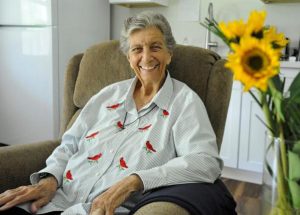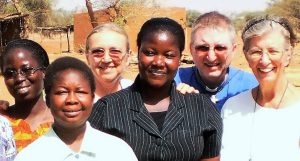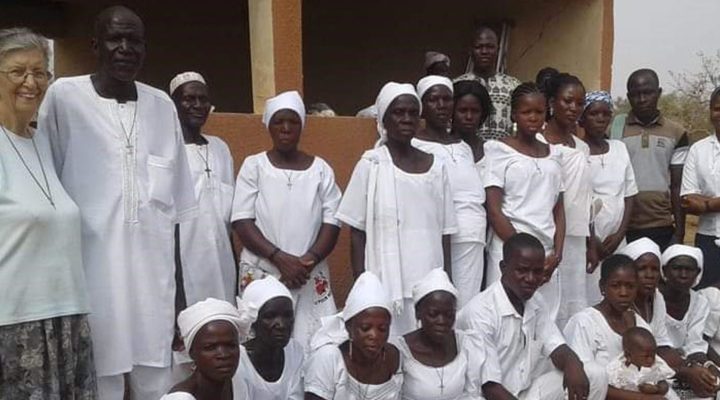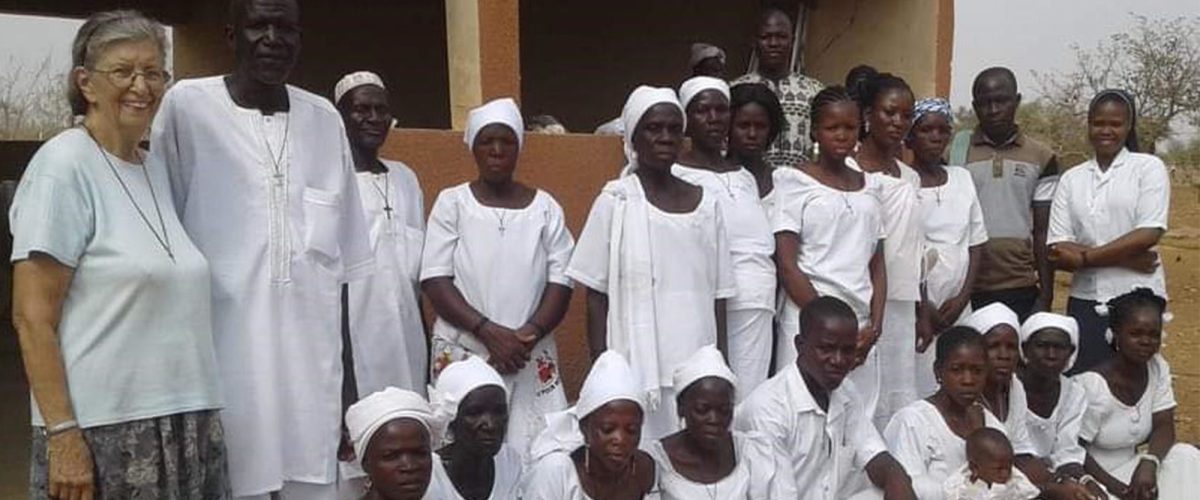Days after regaining her freedom from marauders who invaded her home and kidnapped her in Burkina Faso, Suellen Tennyson, an American Catholic nun, has recounted her experience in the hands of her captors.
In an interview with the Clarion Herald, newspaper of the Archdiocese of New Orleans, Tennyson recalled how on that fateful night in early April unknown men invaded the missionary home she shared with sisters in Yalgo, northern Burkina Faso, and whisked her away. She ended up spending five months in their custody, during which time she was moved from place to place, in what bore the trademark of Islamic militants operating in the country. And then, when it seemed like her nightmare was going to get worse, she regained her freedom on Aug. 30.
Upon being freed, she relocated to New Orleans.

Suellen Tennyson at home in New Orleans
Recounting her ordeal, Tennyson said in all her days in captivity, her trust in God never wavered. “Prayer sustained me. I went through my Mass every day. I did each part of the Mass and received spiritual Communion. During the day, at least three or four times a day, I would do a spiritual Communion. That was the thing that kept me going because I had nothing.”
She also revealed her state of mind prior to being taken captive.
“I thought maybe they were going to leave me sitting on the porch, but all of a sudden they wrapped me up and took me,” she recalled. “Whoa, this was not what I thought was going to happen. But from the beginning, I was asking God to please use this for good. I don’t understand why it’s happening; I don’t understand why they took me.”
After five months of uncertain fate in the hands of strangers, Tennyson found herself in neighboring Niger Republic and suddenly released to U.S. security officials. Thereafter, she boarded a plane and headed for the U.S.
“I cannot even comprehend or find a way to express the gratitude that’s in my heart for all the people who have been praying for me.”
Asked how she feels, Tennyson said she feels good and is grateful to all those who prayed or worked to get her released: “The feeling that overwhelms me is the feeling of gratitude. I cannot even comprehend or find a way to express the gratitude that’s in my heart for all the people who have been praying for me. I always knew my community and my family and friends were praying, but now I’m finding out there were thousands of people praying for me all over the world; I’m finding out all the FBI agents and embassies that were working to find me; all the people.”
Tennyson is one of a number of religious leaders who have been victims of criminal or insurgent attacks in Burkina Faso in recent years.
In May 2021, BNG reported that some clergy lost their lives in their encounters with criminal or terrorist groups. They include Father Rodrigue Sanon, who was the parish priest of Notre Dame de la Paix in Soubakanyedougou, southwest of Burkina Faso. He went missing for two days before his body was found. Others are Father Siméon Yampa and five other parishioners; a Protestant pastor and five other faithfuls, and a Spanish priest, all of whom lost their lives, as well as Father Joël Yougbaré, parish priest of Djibo, who disappeared without a trace.
“Armed Islamist groups abducted scores of civilians from villages, public vehicles and displacement camps.”
According to a Human Rights Watch report, “Throughout 2021, armed Islamist groups abducted scores of civilians from villages, public vehicles and displacement camps. Victims included religious and health workers, village chiefs, traders and displaced people. Many of the abducted, including a priest, were later killed, while at least 27 villagers abducted from public vehicles between the towns of Dablo and Barsalogho in June and July were unaccounted for at time of writing.”
It added: “Islamist group fighters also burned villages, markets, and businesses; abducted and raped dozens of women; imposed their version of Sharia (Islamic law) via courts that did not adhere to international fair trial standards; and prevented farmers from accessing their fields.”

Suellen Tennyson (far right) with other workers in Burkina Faso
In one such attack, more than 150 people reportedly lost their lives near the town of Arbinda, when a convoy of civilians that were being escorted by military police came under attack by Islamic militants. The death toll included 59 civilians, six pro-government militiamen, 15 military police and 80 militants.
A U.S. State Department report on Burkina Faso for 2021 confirmed the prevalence of violence in Burkina Faso, concluding that these events contributed to “a humanitarian crisis and the internal displacement of more than 1.5 million persons.”
These security challenges come despite the efforts of security officials operating under the command of the country’s current military government. In January those officials said they would stem the menace of criminal and insurgent groups after they overthrew the democratically elected government of Roch Marc Christian Kabore.
Not much has changed for good since then. In June, for instance, at least 79 people lost their lives when armed men launched an attack on the town of Seytenga, according to the United Nations.
Prior to the military putsch, many Burkina Faso residents took to the streets to protest the incessant attacks and insecurity in the land. Burkina Faso is a member of the group of five formed in 2017 to tackle insurgency in the restive Sahel region. Other members of the group are Chad, Mali, Mauritania and Niger.
Anthony Akaeze is a Nigerian-born freelance journalist who lives in Houston. He covers Africa for BNG.
Related articles:
Climate change is heating up the terrorist conflict in Africa’s Sahel region
Another year, more conflict in Africa; where’s the off ramp?


